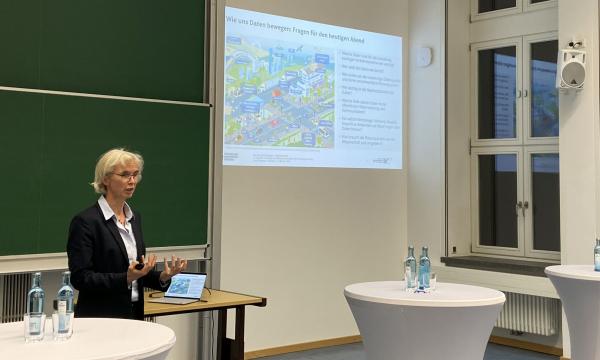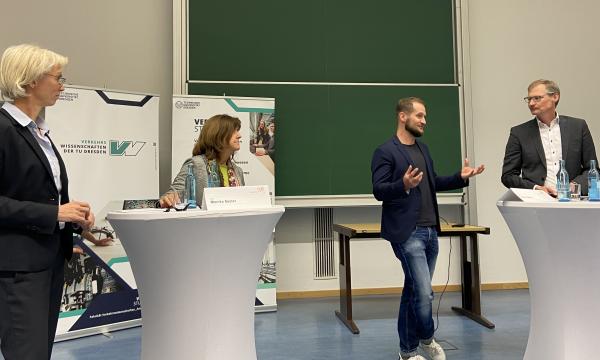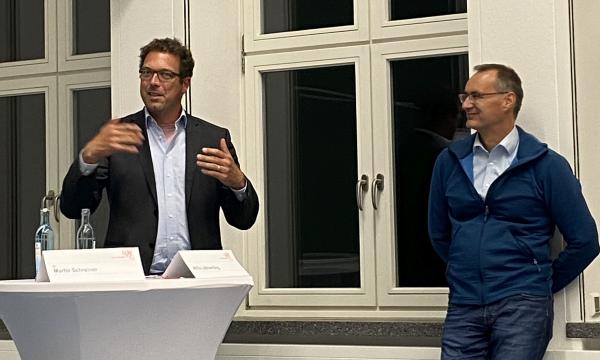
You are here
Science, companies and local authorities in dialogue
Opportunities and challenges of data-centred transport planning: specialist event of the German Transport Science Association - Saxony District Association.
Several times a year, the Deutsche Verkehrswissenschaftliche Gesellschaft e. V. - Bezirksvereinigung Sachsen organises specialist events with panel discussions. This was also the case on 17 October, this time at the "Friedrich List" Faculty of Transport and Traffic Sciences at TU Dresden. The topic of the evening is currently becoming increasingly important: How data moves us - opportunities and challenges of data-centred transport planning.
Representatives from science, business and local authorities provided insights into how data is obtained, processed and used today, in particular to meet the challenges of the climate and transport transition. For example, they discussed new methods of collecting transport data and their application.
The invited guests were
- Prof Monika Sester, Institute of Cartography and Geoinformatics, Leibniz University Hannover
- Dr. Jan Kätker, Managing Director of VMZ - Verkehr Mobilität Zunkunft - Berlin
- Dr. Martin Schreiner, Mobility Department of the City of Munich, Head of Division 1 "Strategy" and his colleague Attila Lüttmerding, Head of the Basics and Data Department
- Dr. Sven Lißner, Research Assistant at the Chair of Transport Ecology at TU Dresden
Moderated by Professor Regine Gerike, Dean of the Faculty and Head of the Chair of Mobility System Planning at TU Dresden, the short presentations were followed by a panel discussion in which questions relating to data quality, data origin and communication were addressed and the cooperation between science and practice was looked at.
Short presentations: Insights into current research / work on data and transport planning
Prof. Monika Sester presented the "Mobile Mapping Van" as a new method of data generation. This is a car equipped with sensors and cameras that drives through the streets of Hanover and takes a snapshot of its surroundings. By repeating the process several times a day, changes in the environment can be recorded, e.g. delivery times by service providers such as the post office or the emptying of rubbish bins. This information is used to carry out studies to optimise parking spaces for residents or to optimise routes for service providers. According to the scientist, initial tests have already been successfully carried out in the city of Hanover.
From the TU Dresden, Dr. Sven Lißner presented the role and application of digital cycling data using the MoveOn project as an example. This involved sending test subjects with smartphones on bicycles through Dresden, resulting in "very good data" and a correspondingly high level of municipal interest. In order to generate cycling data across Germany, Sven Lißner and his colleagues at the Chair of Transport Ecology have been working with the "Stadtdradeln" initiative for several years, which is characterised by a sharp increase in the number of participants. Furthermore, science faces problems when analysing data, as car journeys or even air travel are sometimes incorrectly recorded as cycling trips and the data is therefore falsified.
Dr. Jan Kätzker from VMZ in Berlin works in the fields of traffic consulting and app development. He and his team are investigating the question of whether data collection can be operated economically as a business strategy. Local authorities have a great interest in this, as they are responsible for maintaining the infrastructure and usually lack the budget to purchase "expensive data". Jan Kätzker also addressed the "mobility ecosystem", which is not just about getting from A to B, "but also which services or measures we need to implement in the infrastructure".
Dr Martin Schreiner and Attila Lüttmerding from the mobility department in Munich represented the perspective of the local authorities and presented insights into the "Mobility (data) strategy of the city of Munich". Important indicators are traffic volume, accessibility and road safety. Data from installed sensors and mobile phone data are already being used for this purpose. In recent years, the city of Munich has seen a 20 to 40 per cent reduction in traffic in the city centre. This shows that the traffic change in the urban environment is already progressing. However, both pointed out that a Germany-wide traffic turnaround could only be achieved if rural traffic was also reduced in this way.
Impressions from the discussion evening
Impressions from the discussion evening
Lively panel discussion between science, business and local authorities with many questions from the audience
In the subsequent panel discussion, a number of issues and different perspectives were discussed based on the previous presentations.
When asked about the origin of the data and the role of commercial providers, Dr. Martin Schreiner from the City of Munich said: "We collect our data ourselves and do not use commercial providers." The VMZ Berlin, on the other hand, utilises data from the private sector that has been generated through the use of sensor technology.
The scientific community is also involved in providing data. Sven Lißner explains: "We are primarily concerned with previously neglected models such as walking and cycling, as companies cannot work economically to maintain a comprehensive cycle network. Furthermore, science is very good at efficient data storage, which is why we play a moderating role here."
Prof. Monika Sester sees the free use of data as "not a sustainable business model, which is why local authorities need to recognise the value in the data. Analysing data involves a great deal of effort, which is usually still underestimated."
For municipal transport planner Attila Lüttmerding, it's less about the data itself and more about the question of "how much a measure achieves, for example the separation of cycle paths and traffic lanes. We in the municipalities want results, not huge amounts of data."
This is because the size of the data volumes is an enormous challenge - both technically and analytically. "You very quickly reach your limits when collecting data, even if you try to reduce the data to the bare minimum," said traffic researcher Sven Lißner. From Martin Schreiner's point of view, "all local authorities need a digitalisation strategy, as efficient processing of the data is necessary in order to pass it on to politicians. Science could provide support here, as trust in it is very high."
The audience asked whether and how data can help support the transport transition. Attila Lüttmerding was sceptical: "We can't do that with data. Alternatively, we need to create opportunities, such as the expansion of public transport in rural areas." Prof. Regine Gerike sees data as "a very good communication tool for communicating changes and successes." In her view, it is also important "that citizens are involved, as they provide the data".
There were numerous questions from the audience that evening, which were not exhausted even after more than two hours. "That shows how exciting and topical the subject is," said the moderator. The lively discussions continued after the event.
Originalautor
Conclusion of the evening
Large quantities of data are already being collected. Its applicability is not always clear. This is also due to the highly dynamic nature of the transport system.
One of the biggest challenges for science, business and local authorities is to ensure the quality of the data and to generate a representative quantity. The infrastructure providers are striving for solutions and want to achieve clear results. To this end, cooperation between research and industry is absolutely essential in order to make data affordable and thus accessible to as many people as possible, also with a view to communicating with citizens.
Background: Goals of the Munich mobility strategy
The city of Munich's mobility strategy comprises 19 sub-strategies. By 2025, for example, at least 80 percent of urban traffic is to be made up of zero-emission vehicles, local public transport, walking and cycling. By 2035, traffic should even be climate-neutral.
The goals also include changes in the area of "shared mobility" through the creation of 2,500 stationary parking spaces and the construction of 200 mobility points. Furthermore, under the name "Vision Zero", the aim is to reduce the number of fatalities in urban traffic to zero.
These goals require massive investment and optimization in urban traffic in order to maximize the efficiency of the infrastructure.
Contacts at TU Dresden
Prof. Dr.-Ing. Regine Gerike
Head of Chair of Transport Mobility Planning
"Friedrich List" Faculty of Transport and Traffic Sciences at TU Dresden
Mail: regine.gerike@tu-dresden.de
Dr.-Ing. Sven Lißner
Research Associate
Chair of Transport Ecology
"Friedrich List" Faculty of Transport and Traffic Sciences at TU Dresden
Mail: sven.lissner@tu-dresden.de



